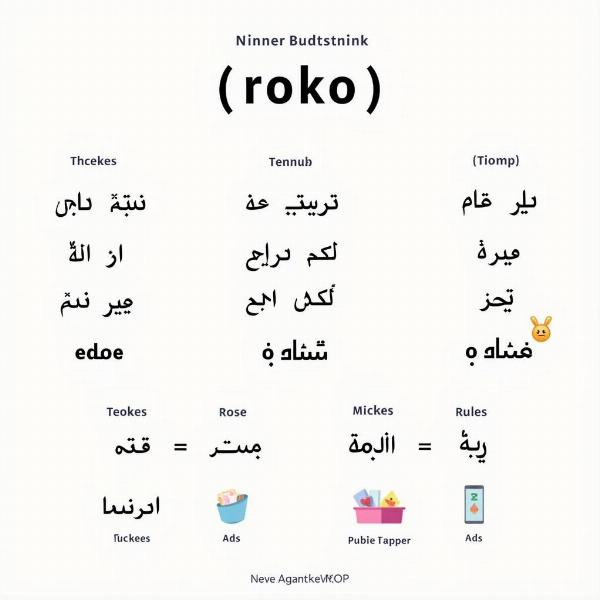Understanding the meaning and usage of “roko” in Hindi is crucial for anyone learning the language or seeking to delve deeper into Indian culture. “Roko” is a commonly used verb in Hindi, and its meaning can vary depending on the context. This article will provide a detailed exploration of “roko,” its various meanings, grammatical nuances, and cultural implications.
Understanding the Core Meaning of Roko
The most common meaning of “roko” in Hindi is “to stop” or “to halt.” It can refer to stopping a physical action, preventing something from happening, or interrupting a process. For example, you might say “gaadi roko” (गाड़ी रोको) to tell someone to stop the car. The word originates from the Sanskrit root “रुध् (rudh),” which also carries the connotation of obstruction or prevention.
Grammatical Usage of Roko
“Roko” is a transitive verb, meaning it requires an object. The object is the thing being stopped. The verb conjugates based on the tense, gender, and number of the subject. For example:
- Main tumhe rokoonga (मैं तुम्हें रोकूँगा): I will stop you (masculine/singular).
- Hum usse rokेंगे (हम उसे रोकेंगे): We will stop him/her/it.
Understanding these grammatical variations is essential for using “roko” correctly in different situations.  Diagram illustrating the conjugation of "roko" in different tenses and genders Learning how “roko” changes based on the subject helps learners construct grammatically correct sentences.
Diagram illustrating the conjugation of "roko" in different tenses and genders Learning how “roko” changes based on the subject helps learners construct grammatically correct sentences.
Cultural Context of Roko
“Roko” also finds its place in various cultural expressions and idioms. For instance, “kisi ko rokna” (किसी को रोकना) can metaphorically mean to prevent someone from achieving something. This usage reflects the importance of social dynamics and relationships within Indian culture. “Rok tok” (रोक टोक) is another related term that implies restrictions or limitations, often used in the context of societal norms and expectations.
Different Contexts and Meanings of Roko
Besides the primary meaning of “stop,” “roko” can have other nuances depending on the context:
- To obstruct: “Rasta roko” (रास्ता रोको) – Block the road.
- To restrain: “Apne aap ko roko” (अपने आप को रोको) – Control yourself.
- To detain: “Police ne chor ko roka” (पुलिस ने चोर को रोका) – The police detained the thief.
Roko in Legal and Official Settings
In legal and official contexts, “roko” signifies a formal order to stop or cease an activity. Understanding this usage is crucial for navigating legal procedures and official interactions.
Conclusion
“Roko” is a versatile word with various meanings and applications in Hindi. This guide provides a comprehensive overview of the word, its grammatical usage, and its cultural significance. By understanding the nuances of “roko,” learners can enhance their language skills and better appreciate the richness of Hindi and Indian culture.
FAQ
- What is the literal meaning of “roko”? The literal meaning of “roko” is “to stop” or “to halt.”
- How do you conjugate “roko”? The conjugation of “roko” varies depending on the tense, gender, and number of the subject.
- Can “roko” be used metaphorically? Yes, “roko” can be used metaphorically to mean preventing someone from achieving something.
- What is the meaning of “rok tok”? “Rok tok” means restrictions or limitations.
- How is “roko” used in legal settings? In legal settings, “roko” signifies a formal order to stop.
Meaning-Hindi.in: Your Trusted Hindi Translation Partner
Meaning-Hindi.in offers professional Hindi translation services for businesses, individuals, and organizations. We specialize in legal, technical, business, and website translation, ensuring accurate and culturally sensitive translations. Our expert linguists provide high-quality translations that bridge the language gap and facilitate effective communication. Contact us today for all your Hindi translation needs at [email protected] or +91 11-4502-7584. Meaning-Hindi.in is your one-stop solution for accurate and reliable Hindi translations.